
With a new alumni club and a growing network, Booth graduates are making their mark on a continent full of possibilities.
- By
- May 09, 2019
- Global

It’s an exciting time to do business in Africa. Of the world’s 10 fastest-growing economies in 2018, six were in Africa, with Ghana topping the list. More than 400 companies across the continent have at least $1 billion in revenue. The middle class is rising, and by 2050 the number of young people entering the workforce in Africa is expected to exceed that of the rest of the world. These young people are increasingly living in cities and rapidly adopting technology, expanding their access to opportunity.
This potential inspired Adja Diakité, ’18 (EXP-23), to help launch Chicago Booth’s Alumni Club of Africa in 2018. “This continent has a lot to deliver,” said Diakité, who was born in Mali and grew up in France, where she told her teachers that she wanted to find a way to give back to her birthplace someday. “Everywhere I go in Africa, I’m always amazed by the young people and their entrepreneurial mind-set. I have a passion for getting people connected.”
(Meet one such alumnus, Van Jones, ’14, cofounder of Nigeria-based Hello Tractor, and learn his best advice for working in Africa.)
From entrepreneurship to social impact to finance to development, alumni across Africa are connecting to share ideas and expertise, and they’re using their Booth education to make an impact in business and in their communities. As of early 2019, Booth counted more than 100 alumni in Africa: mostly in Nigeria, South Africa, Egypt, and Kenya, but also in 17 other countries, from Morocco and Tunisia in the north, to Ghana and Ivory Coast in the west, to Namibia and Botswana in the south. Stop in Nairobi, Lagos, or Johannesburg, and you might find more than a dozen alumni to visit in each city.
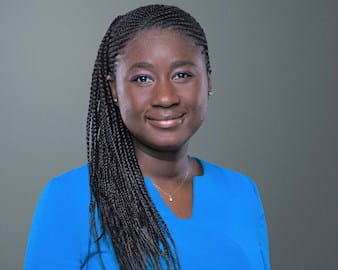
When Diakité joined Booth, she started a conversation with staff members about building stronger bonds among these alumni. While in London in 2017, she organized the club’s inaugural event, which brought together experts in media, private equity and banking, development, and small business. The keynote speaker was Amy G. Lehman, AB ’96, MBA ’05, MD ’05, founder and CEO of Lake Tanganyika Floating Health Clinic and a 2014 recipient of Booth’s Distinguished Young Alumni Award.
“It’s a bit of a challenge, because Africa is huge—54 countries,” said Diakité, who is president of the new alumni club. “But we try to connect at the local level, putting different regions together.”
In each country with Booth graduates, the Alumni Club of Africa is recruiting volunteers to host local events. This year, Diakité hopes to start with a few regional gatherings. The group also uses technology to overcome distance; in March, for instance, the club hosted a webinar on investing in South Africa, the first in a planned series of educational discussions.
“In terms of population growth and GDP growth, Africa is the future,” said Randall S Kroszner, deputy dean for executive programs and the Norman R. Bobins Professor of Economics. “I am very excited that we have been having success in recruiting students from Africa, and I look forward to further increases in enrollments and to deepening engagement. I want to show how the Chicago Booth way of thinking can improve business practice and government policy throughout the region. We already have graduates who are demonstrating our impact.”
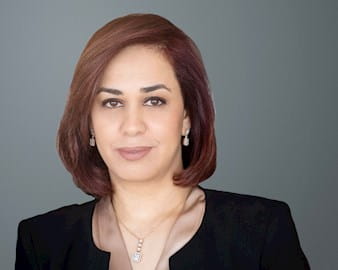
Mariam Elsamny, ’08 (EXP-13), vice president of the Alumni Club of Africa, said the club initially will focus on a few key themes, such as entrepreneurship and financial inclusion. “We’re trying to plan events that leave an impact,” said Elsamny, who lives in Cairo and is Booth’s regional advisor for North Africa. “In doing so, we’re also building the Chicago Booth brand.”
More than a decade after graduation, Elsamny maintains ties with Booth alumni in Egypt and elsewhere. “We have our WhatsApp group connecting people across the globe. We’re in touch and go on trips together,” she said. And the relationships aren’t just social. In Cairo she meets regularly to talk business with alumni from Booth and from Ivy League schools such as Harvard, Stanford, and Yale. “You’re able to deal with decision-makers and pioneers,” she said.
Similarly, Costa Economou, ’10 (EXP-15), is keeping up with classmates and creating new connections. In Johannesburg, he meets with prospective students at least once a month, participates in formal Booth networking events, and stays in touch with dozens of classmates, several of whom live nearby. He also travels for annual alumni get-togethers; last year, he flew to London for dinner with 30 people. “The friendships that were forged are incredibly strong,” he said.
Economou, who’s originally from South Africa, at first saw Booth’s international network as a means of developing a career in the United States or the United Kingdom after finishing Booth’s Executive MBA Program in London. But he graduated into the global financial crisis. Suddenly, the best opportunities were back in his home country, where the economy was relatively unscathed.
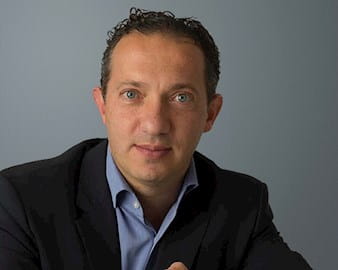
He applied what he had learned about the value of broad social networks from Ronald S. Burt, the Hobart W. Williams Professor of Sociology and Strategy. “South Africa is an incredibly diverse place,” Economou said. “The rightful fall of apartheid and the subsequent democracy we have come to enjoy have meant that we have to embrace diversity. Burt showed that creating networks that are more diverse increases value in everything you do. We’ve seen those benefits in terms of how we engage with our prospects and our clients.”
The expansive alumni network also helped Economou by connecting him with David Booth, ’71, cofounder and executive chairman of Dimensional Fund Advisors, which has more than $500 billion in assets under management. “If you look at the size of our market relative to the size of the business David runs, it’s not even a drop in the ocean,” Economou said. “Despite that, his level of commitment to helping us on our own journey has been remarkable.” The two firms established a joint-venture agreement, and now Colourfield partners with Dimensional to serve the retirement-fund industry in southern Africa.
Economou isn’t the only one whose Booth education empowered him to start his own business. Fellow Johannesburg resident Samantha Pokroy, ’04, leveraged her MBA to break into private equity and then to found Sanari Capital, a South African private equity firm that specializes in founder-run, owner-managed, and family-run businesses.
“From a very early age, I wanted to do ‘private equity,’ or help grow private companies, even though I didn’t know it had a name,” Pokroy said. When she arrived at Booth, she was advised to start off in investment banking. Pokroy dutifully complied, landing a full-time job offer—and then she turned it down. She couldn’t stop thinking about the ownership element and how important that was to her, in keeping with her family’s own entrepreneurial roots. Career Services supported Pokroy in her off-campus job search, and Steven Neil Kaplan, the Neubauer Family Professor of Entrepreneurship and Finance, encouraged and guided Pokroy, introducing her to his industry connections.
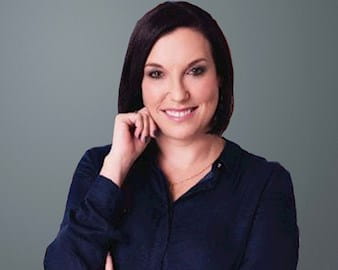
While it was nerve-racking to graduate without a job, Pokroy secured an internship in private equity a month later. A few months after that, she landed the private equity job she had long dreamed about. In 2013 she pursued her own entrepreneurial ambitions, founding Sanari Capital. The firm is focused on the lower mid market in South Africa and incrementally in other African markets. The firm has concluded four investments with another two being added to the fold soon.
In South Africa, Pokroy said, many of the missed private equity opportunities are in small and medium-sized businesses where she and her team have to take a hands-on, individualized approach to creating value.
At Sanari, Pokroy combines what she learned about evaluating businesses in the New Venture Strategy course taught by James E Schrager, clinical professor of entrepreneurship and strategy, with her background in psychology and finance. She often has to coax founders to make difficult decisions that will take their businesses to the next level. “There’s more to it than a simple financial equation,” she said. “The thing I enjoy the most is when you see a founder recognize, and then realize his or her potential.”
Pokroy’s Booth professors get to see her realize her own potential as well. When Kaplan visited Johannesburg in 2017, he and his family had dinner with Pokroy. “When you know people like that are in your corner, in every corner of the planet, that’s quite a special thing,” she said. “It helps you to stay the course even when the entrepreneurial journey is tough.”
For Elsamny, in Egypt, the Executive MBA Program stoked a passion for building new brands. She already had an MBA from the American University in Cairo, but Citibank, her employer at the time, nominated Elsamny and six other employees from her region to earn a Booth degree, all expenses paid. “It came at the right time to refresh my skills and make me think in a different way about everything,” she said.
This expanded mind-set inspired Elsamny to take on a more innovative, less structured role. After Citibank, she became the sixth employee in a joint venture between the sovereign wealth funds of Singapore and Abu Dhabi. She eventually became CMO of the venture, Dunia Finance, which is headquartered in Abu Dhabi and provides comprehensive financial solutions to customers including loans, credit cards, corporate deposits, and other financial services. Recently, she moved back to Cairo, taking on a startup role within First Abu Dhabi Bank, one of the largest banks in the Middle East. With the bank’s focus on Egypt as a high-potential market, the bank asked Elsamny to spearhead their personal-banking business there—an enticing challenge in a dynamic and evolving market.
“Booth has spoiled me a little bit, in that I am always keen to engage in nontraditional roles,” Elsamny said. “I like to do something different, something that has that startup twist.”
For many students with an entrepreneurial spirit, a Booth MBA is appealing because of the program’s balance of creative thinking and analytical rigor. In 2002, before applying to Booth, Anthony Siwawa, ’10 (AXP-9), had already founded Venture Partners Botswana, the first private equity firm in that country. His firm was growing, as he and his partners spent years educating investors about the benefits of private equity as an asset class. But Siwawa knew he wanted to expand both his global network and his knowledge base, particularly with respect to growing his business. And his classes at Booth’s Asia campus led to an epiphany.
“One of the things that I really picked up from Booth is that the use of empirical data is fundamental to success. However, access to information in our markets is a fundamental problem,” Siwawa said. “You are literally making investment decisions with your eyes closed. It helped me realize that I needed to find a model that would allow us and our business to circumvent the problem. That became a mantra for us.”
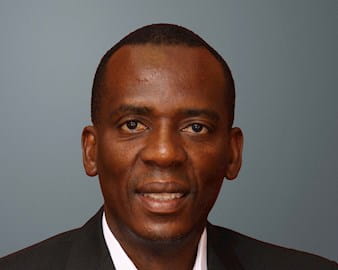
His solution: hire people to do the extensive research needed to evaluate investment proposals and own that research. That shift gave his firm an advantage over those that simply relied on business owners’ claims about their market potential. “For example, if it’s a business that wants to make potato chips, and you know that in Botswana you don’t have a big potato-farming industry, then you’ve got to find a way of learning about all the access points in the country where the potatoes come in, and find out how many potatoes come into the market in a year, and in what form and to whom,” Siwawa said. “That becomes a different discussion, as opposed to generally asking, ‘Is there a market?’”
Devoting more resources to gathering data has helped Venture Partners Botswana succeed. The firm invests in sectors that are positively correlated to infrastructure development, such as health care, education, transport, and logistics. It is now raising capital for its third fund, which Siwawa expects to close at $60 million to $100 million.
In the meantime, he continues to tap Booth’s global network to fill his need for data and for alliances—and he gladly responds to his classmates’ requests to learn about sub-Saharan Africa. “There have been a number of occasions where I needed information to help me with a certain task, and I was able to pick up the phone or send an email to someone in Australia, Chicago, Hong Kong, or Taiwan,” he said. “I was looking at my email two days ago, and there was a name of this chap in Angola. I didn’t know there was an alum in Angola, and there’s something specific that I want to learn about in Angola.”
Booth alumni in Africa have also used their education to move into more traditional leadership roles at large organizations. A few months after he earned his MBA, Funso Akere, ’15 (EXP-20), relocated from South Africa to Nigeria and was appointed chief executive of Stanbic IBTC Capital Limited, the leading investment banking institution in Nigeria and a member of Standard Bank Group, which is Africa’s largest banking group. His responsibilities include providing innovative M&A advisory, capital raising, and debt financing solutions to local corporates and multinationals operating or looking to operate in Nigeria.
He hadn’t expected to land such a high-profile role so soon after graduating, but it was the type of opportunity he’d hoped for when seeking a rigorous MBA program.
“Having spent 13 years in investment banking before my MBA, I felt that for the next phase of my career, which I anticipated would involve more leadership responsibilities, I needed to broaden my leadership ability and management skills through a formal course of management and leadership learning,” said Akere, who is based in Lagos.
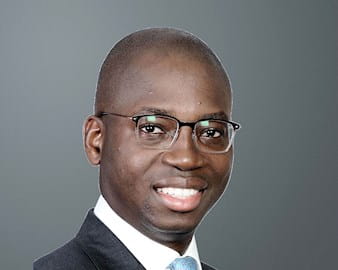
Starting with the first exercise in his Leadership Exploration and Development (LEAD) course, he began developing a new perspective. Standing in a circle, class members had to create a poem by having each person contribute a word in rapid succession. “The natural instinct is that this is going to be a disaster, because it’s not planned,” Akere said. But when the group read back the completed sentence, it made sense.
“The learning was that most times, you have to give things a chance and trust people,” Akere said. “That meant that when we went into group discussions, instead of one person trying to dominate or shoot down an idea, we were more open to listening and embracing each other’s ideas and perspectives. Now, managing a business of close to 50 people, I have to let go as a leader and focus on building high-performing, agile teams that are empowered to serve our clients and make decisions independently.”
That wasn’t the only insight Akere picked up from his classmates. At first, he said, he was constantly ducking out of class to take client phone calls and join work conference calls. Gradually, he noticed that he was the only one. “You had people who were managing very large funds, developing massive projects in the Middle East, and running multinational organizations,” he said. If they could block out distractions, so could he. Over a few weeks, Akere changed his habits and was able to become fully present. That newfound balance improved his focus and decision-making ability—important skills that have helped in a role where many priorities compete for his attention.
Diakité, the president of the Alumni Club of Africa, also credits her Booth experience with preparing her to stand out in a big company. “I can see for myself that I’ve changed,” says Diakité, who recently took a new role on BNP Paribas’s inspection générale–global markets audit team, based out of London, with special assignments worldwide. “Before, I could have explained things, but without taking time to design a framework or think about how to effectively reach people. Now I’m a better leader in terms of being an adaptable listener as well as communicating well with my audience.”
Her new position and its frequent travel requirements also give her plenty of opportunities to connect with Booth colleagues. On a recent trip to Singapore, she said, she saw at least six of her classmates. On the morning of her interview for Chicago Booth Magazine, she was in Hong Kong, where she was scheduled to have lunch with another Booth graduate later that day. She also plans to build the alumni club’s network during an upcoming trip to Ivory Coast. And she’s scouting locations in support of her next big goal: to organize the first Booth forum in Africa in 2020. All of it is a testament to her efforts to bring together MBA alumni across a large, fast-growing region full of rising young stars.

The founder of Jodi365.com reflects on the reading, food, experiences, and apps that make him tick.
Inspirations at Work and Play
Inspired by a Booth professor, Peter Williams, ’10 (AXP-9), discovered that remaining open to possibilities is a dependable way to ensure new ideas find you.
A Predictable Route to Serendipity
This year's winners are rethinking the future of their businesses and communities.
Meet Booth's Distinguished Alumni Award Recipients for 2019